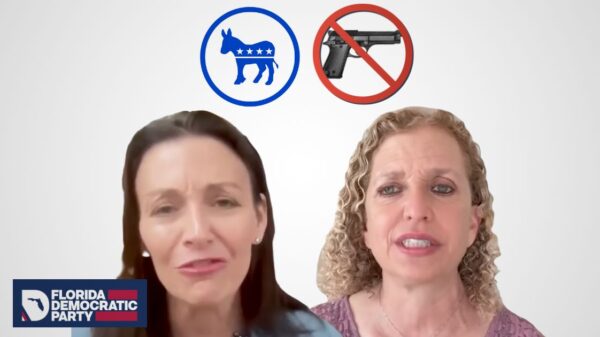U.S. Rep. Debbie Wasserman Schultz, D-Fla., was able to get her proposal to increase funds and reauthorize a breast cancer education program across the congressional finish line and signed into law.
In July 2019, Wasserman Schultz, a breast cancer survivor, teamed with then U.S. Rep. Susan Brooks, R-Ind., to bring out a proposal to add more funds and reauthorize the Breast Cancer Education and Awareness Requires Learning Young (EARLY) Act which was first passed in 2010.
The EARLY Act led to an education and outreach campaign run by the Centers for Disease Control and Prevention (CDC) focusing on the risks young women and women of certain ethnic or racial backgrounds face from breast cancer.
“Reauthorizing the EARLY Act means that we will continue the vital work of educating young and higher-risk women about their breast health and direct their attention to this deadly disease. We must continue supporting initiatives that help identify high-risk women, collect family histories and educate doctors,” said Wasserman Schultz in the summer of 2019 when she brought out her proposal.
“Congresswoman Brooks and I are committed to helping high risk and young women acquire the knowledge and resources they need to not just survive, but thrive,” she added.
“One in eight women in the United States will be diagnosed with breast cancer over their lifetime and 5,820 Hoosier women are expected to be diagnosed with this devastating disease in 2019,” said Brooks who did not run for reelection last year. “It is important to reauthorize the EARLY Act because it shines a necessary spotlight on the threats posed by breast cancer to young women. I’m proud to lead this bill with my friend and cancer survivor Congresswoman Wasserman Schultz because it seeks to educate health care professionals and the public about the importance of young women’s breast health and supports research that will help end breast cancer once and for all.”
“When I was diagnosed with breast cancer at a young age, I was familiar with how my breasts normally felt, so I knew when something felt different and knew I needed to go to the doctor when I felt an unusual lump,” Wasserman Schultz said. “This bill provides younger women with those tools to ensure better understanding of their breast health.”
Wasserman Schultz’s proposal was supported by the American College of Radiology, Breast Friends, Bright Pink, FORCE: Facing Our Risk of Cancer Empowered, Living Beyond Breast Cancer, the Moffitt Cancer Center, the National Black Nurses Association, the National Consortium of Breast Centers, the National Hispanic Medical Association, Oncology Nursing Society, Prevent Cancer Foundation, Sharsheret, Susan G. Komen and Tigerlily Foundation.
The EARLY Act was included as part of the federal funding package which cleared Congress and which President Donald Trump signed into law last week.
Wasserman Schultz weighed in on getting her proposal signed into law last week.
“For young women and those of certain ethnic and racial populations, breast cancer can be even more deadly because it is often more aggressive and too frequently caught later than it should be,” she said. “The EARLY Act of 2020, which reauthorizes the law that I sponsored and passed in 2010 after overcoming my own battle with breast cancer, increases funding and ensures that young women’s breast health awareness, education and grant programs are funded through the EARLY Act at an increased level of $9 million annually from 2022 through 2026. This vital funding will expand the effective Bring Your Brave and Health Care Provider education and awareness programs implemented by the Centers for Disease Control and fund additional grants to young women’s and higher-risk women’s breast cancer organizations. By reauthorizing the EARLY Act, we continue the vital work of educating young and higher-risk women about their breast health and help focus their attention to this deadly disease. Among other things, this legislation will fund grants and support initiatives educate and provide help to young and high-risk women, collect family histories and educate health care providers.
“I know first-hand this law and funding is needed, because I was a young woman who was unaware of my risk and after my breast cancer diagnosis at 41, was diagnosed with the BRCA2 gene mutation. Today, I am still cancer-free because my cancer and my genetic risk were caught early and I am committed to helping high risk and young women acquire the knowledge and resources they need to not just survive, but thrive. The earlier that cancer cases are identified, the better the chances of survival. That is just what the EARLY Act will continue to do: save women’s lives,” Wasserman Schultz added.
Reach Kevin Derby at kevin.derby@floridadaily.com.




















